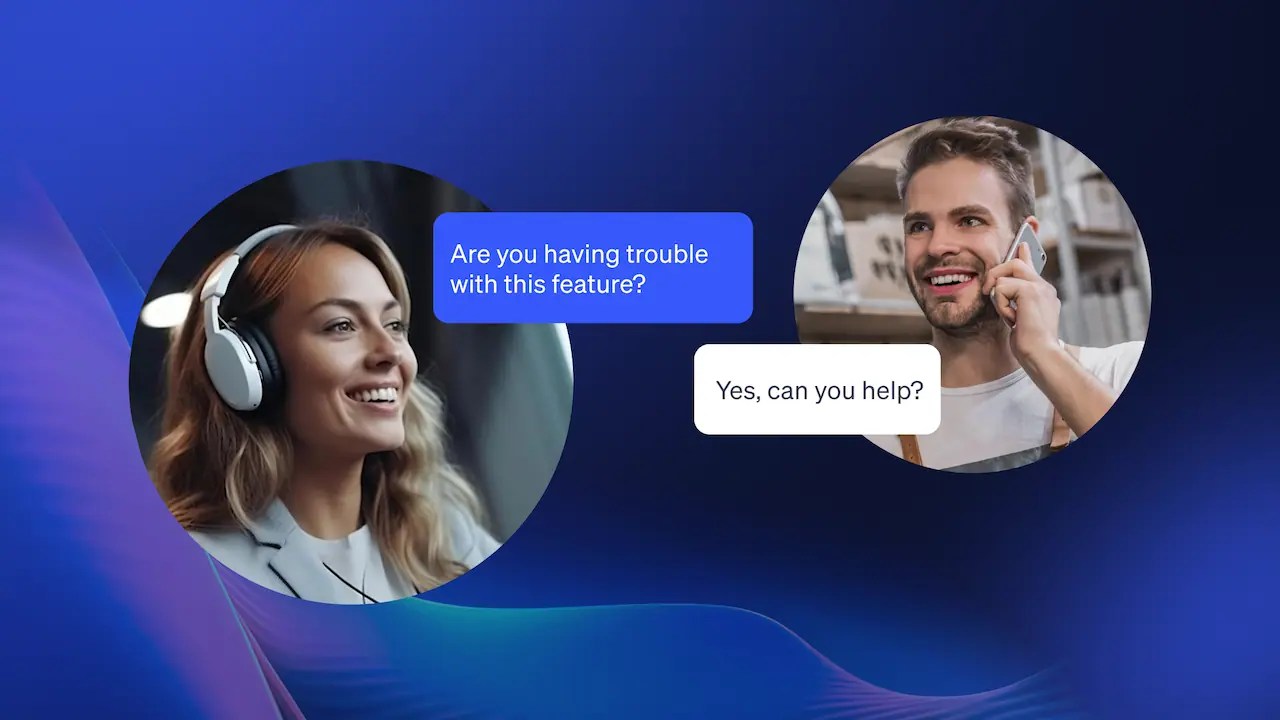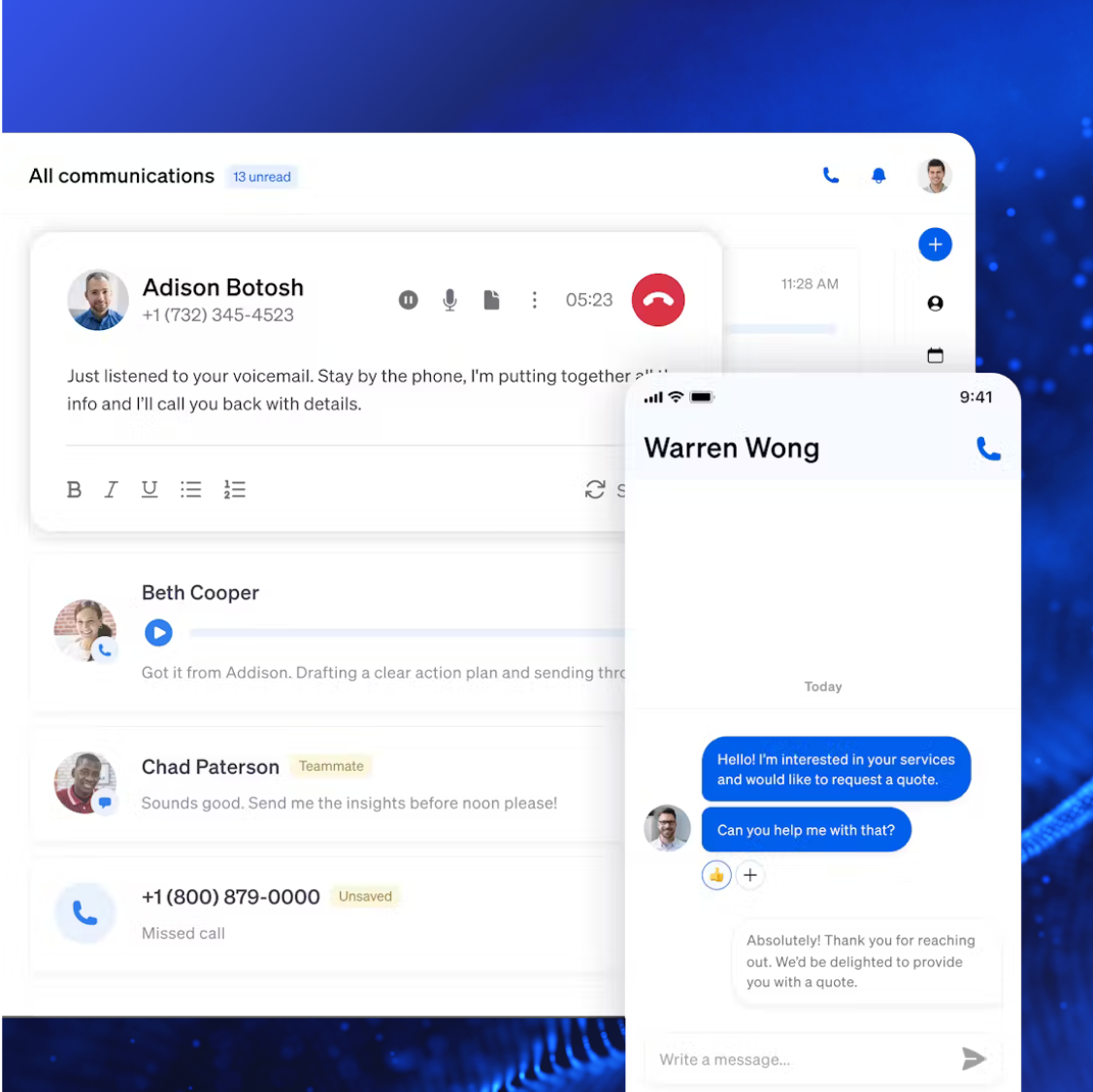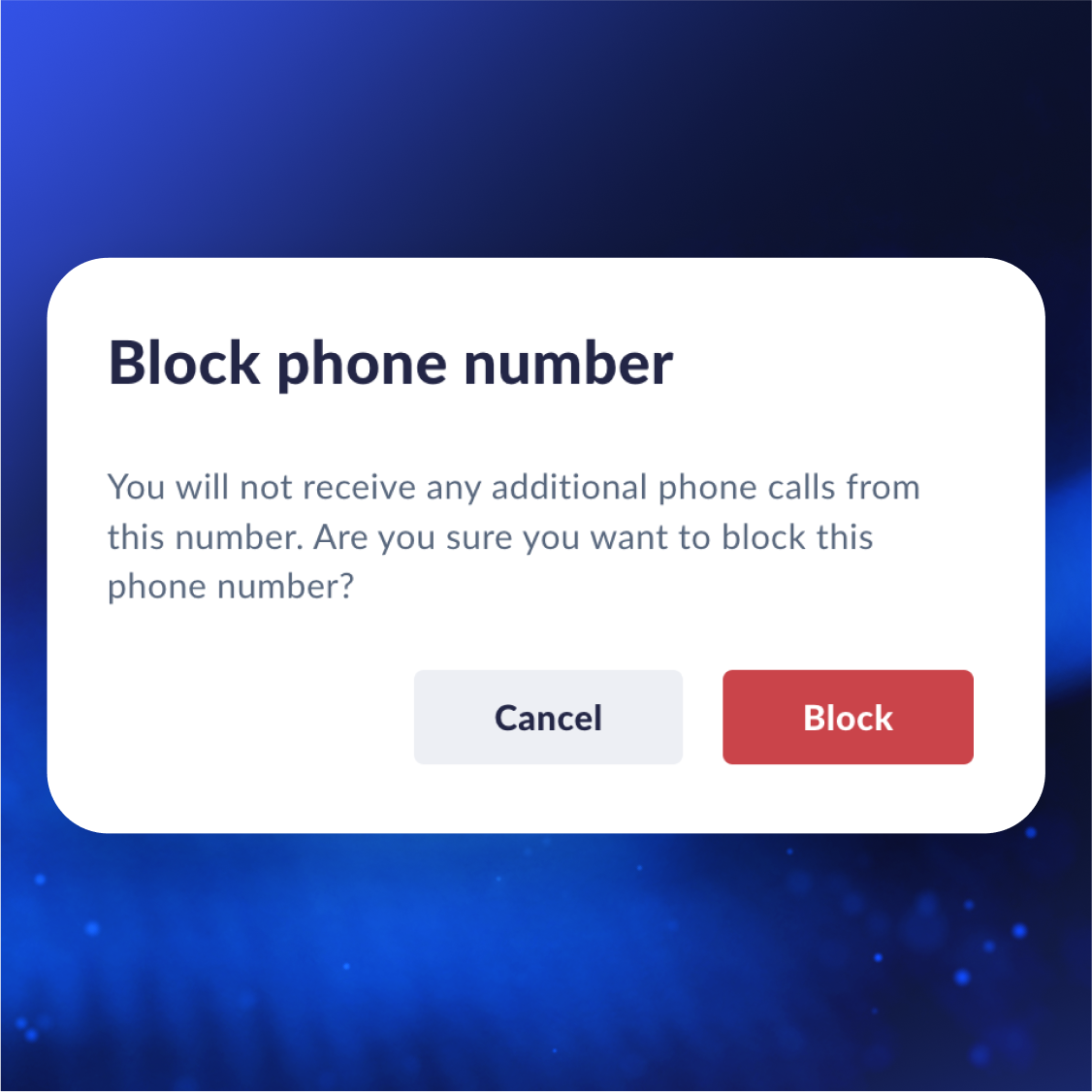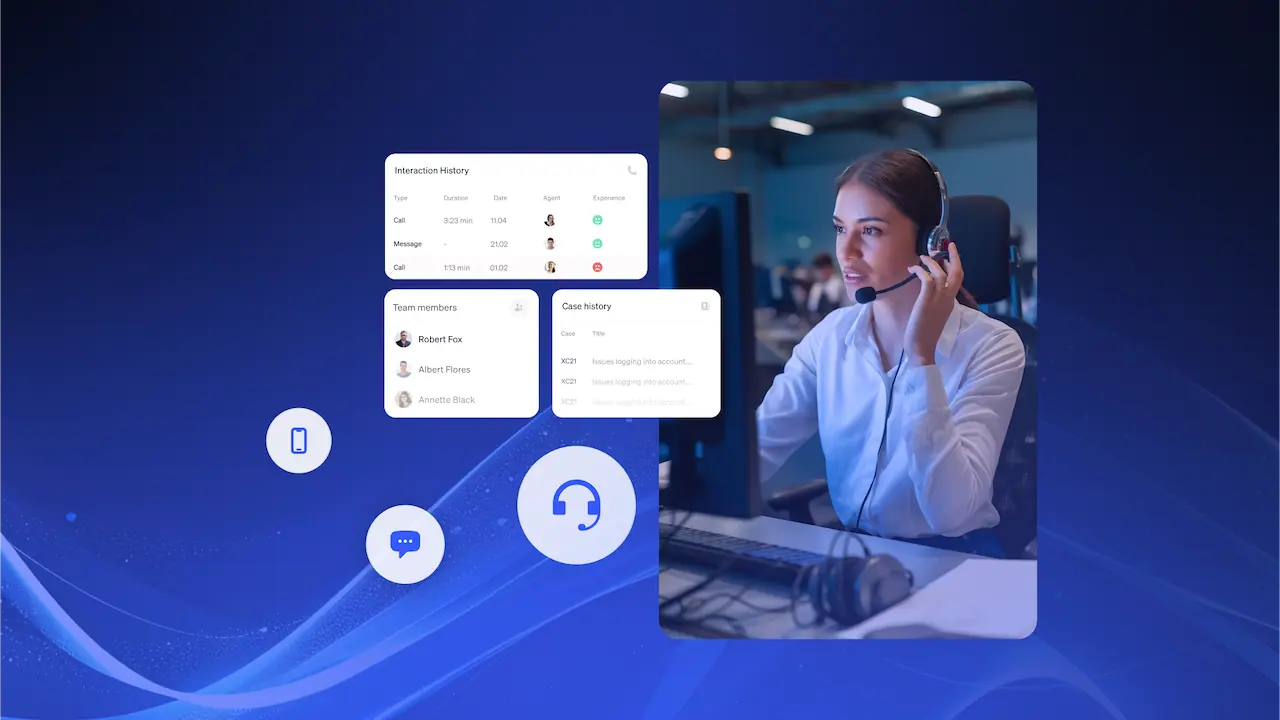Being a real estate agent is a busy job.
You continuously interact with potential buyers in the best way you can. However, as you grow, handling each call with the same professionalism becomes challenging. Sometimes, you’re in the middle of a deal or simply interacting with other potential clients.
In such situations, an increase in daily inquiries becomes directly proportional to lead leakages. A home sale is worth thousands of dollars in commission, so a loss of leads translates into missed commissions.
To effectively manage real estate clients, you need a phone system that helps you receive and route every incoming call and allows you to display your professionalism to existing and potential clients.
A well-managed phone system ensures callers get routed to available agents quickly so you don’t need to fall back on follow-ups.
Why Busy Real Estate Offices Need a Phone System
Real estate professionals make 60-100 calls daily to build and nurture their client base. It’s part of their day-to-day life. However, other clients may buzz them with questions about an ongoing deal while they are on these calls. If you consistently miss these calls, your clients will see you as less accessible, pushing their trust and interest downhill.
A business phone system lets you receive every call and route it to a different agent when you’re busy, ensuring that your clients feel supported.
Various other reasons make a Voice over Internet Protocol (VoIP) phone system necessary for property managers and agents in a real estate business.

High efficiency
A real estate phone system reduces inefficiencies in client communication and makes it easier for realtors to close deals. These inefficiencies include:
- Missing follow-ups after a set time
- Gathering context from previous conversations manually by asking the team
- Not responding to calls when on the go
- Not responding to phone calls during client meetings
A well-reputed phone system offers valuable features like Interactive Voice Response (IVR) and intelligent call routing. It delivers a more streamlined way of connecting clients with agents, reducing the back-and-forth and any delays involved.

Improvements in retention
While consistently supporting clients whenever they reach out, you build rapport with them. It becomes easier for your clients to trust you and remain loyal to you for any needs they have in the real estate sector.
A phone system lets you be at your best regarding follow-ups. It constantly reminds you about follow-ups that are coming due and encourages you to make them on time, meaning your customers quickly receive a satisfactory response.
These follow-ups are not as simple as an agent checking the reason behind a client’s call. The IVR system encourages clients to share what motivates them to reach out.
If someone from your team contacts them, the phone system syncs with your customer relationship management (CRM) software to record all interactions. You follow up after reviewing the recorded data, making communicating with the clients more effective.
Large deal volumes
A phone system increases your team’s ability to handle more calls simultaneously. When you’re busy, your colleagues can take up incoming inquiries for you and vice versa when they’re engaging their clients.
The phone system lets the team coordinate collaboratively to offer customer support to clients, attracting a larger deal volume than before. Most importantly, it eliminates the chances of opportunities slipping through the cracks due to agents being occupied or unavailable for clients at specific hours.

Core Functions Needed in a Real Estate Phone Service
A real estate phone service will help you deliver an exceptional experience to your clients, increasing their trust in your company. It uses the following functions to deliver this experience:
Call routing and auto-attendant
Call routing automatically ensures that incoming calls reach the right agents and departments based on a client’s location, purpose, and requirements. Suppose a client tries to contact an agent outside their working hours. The auto-attendant will receive the call and let clients know that the agent will get back to them as soon as they start their day.

Most importantly, it captures clients’ requirements based on their selections during the call. Nextiva’s auto-attendant lets you configure a phone menu system. Your clients can use it to obtain answers to common FAQs until an agent can get back to them.
The auto-attendant enables intelligent routing through the phone menu system. Clients are routed to someone who can best assist them based on their choices.
This approach ensures clients get the best experience they can while offering scalability for your business.
Mobile integration or softphone
A softphone allows you to use both desk and mobile phones simultaneously, enabling you to take calls on the go. It lets you send text messages while managing all calls through your mobile, which allows for flexibility.
This function becomes handy when you’re on property visits or meeting with clients in their locations. A softphone is an app you use on a desktop or mobile to make or take calls via the internet. But besides calls, it has many other functions.
For example, NextivaONE comes with features like:
- Contact lists: Stores and manages contacts, making them easily accessible on the go.
- Text messaging: Allows SMS or MMS exchanges on the VoIP line.
- Video calls: Facilitates video conferencing on your mobile device through the software application.
- Computer telephony integration: Lets users manage calls through their headsets.
- Real-time presence: Shows if you’re available to take calls, on a call, or unavailable.
- Encryption: Encrypts conversations irrespective of your internet connection.
- Advanced call functions: Offers options to transfer calls to other team members or lets you automate call forwarding with the help of an auto-attendant. It also facilitates call pulling, where you can swap devices (desk phone or mobile) during a call without interruption.
- Conference calls: Allows easy collaboration with your team by inviting them on the same call without a complex dial-in process.

Call tracking and analytics
A reliable real estate phone system tracks all incoming and outgoing calls. It empowers agents to make timely follow-ups, ensuring no lead leakages. A border analysis of these calls reveals the peak times you are usually bombarded with client requests, allowing you to proactively add more staff during peak hours to manage call volumes.
Based on business needs, analytics gives insights into key metrics, including:
- Handle time
- Call time
- Number of outgoing or incoming calls
- Agent availability
- Call dispositions
- Abandonment
- Speed of answer
- Phone calls from toll-free numbers, local numbers, or landlines

When call tracking is paired with speech analytics, you can also get insights into customer sentiments and keyword usage in the conversation. Conversational AI helps deliver such insights from conversations.
Voicemail-to-email/text
Some real estate phone service providers automatically transcribe a voicemail and send it to your email. This reduces the chances of missing potential opportunities from any communication channel, helping to prevent lead leakage.
It also helps you stay on track with follow-ups and creates a positive client experience when they see you responding promptly on any channel they reach out on.

CRM integration
The phone system syncs with your CRM software to track call logs and client interactions. It helps you make CRM the source of truth for all things related to a particular client. Whenever there’s confusion, you can refer to your CRM software and fetch more interaction details when required.
Conversational AI completes the tracking by effectively capturing the content of the interaction. A well-integrated phone system will document all conversational insights on your CRM software, making it easier to track all client communication.

Call management capabilities
You can manage multiple business phone lines simultaneously with a managed phone system. This functionality becomes useful when call volumes increase during peak hours. Think of events such as open houses, showings, or new listings. In such events, agencies record calls and save transcriptions for training or to ensure legal protection.
Call recording helps when coaching teams, enabling a collaborative learning process where agents learn from their peers and get acquainted with different objections they might face from clients.
Lastly, these systems offer features to set reminders for follow-ups after a call ends. It enables your team to proactively support clients at theright time, enhancing their experience with your agency.

Use Cases of Real Estate Phone Systems
There are a few notable situations where real estate phone systems make agents’ lives easier when it comes to offering a professional experience to their clients.
1. Efficient call routing for new listings
When a new property hits the market, multiple agents work on it. A phone system routes calls to agents based on different factors, ensuring that clients can easily connect with your team.

These factors are configurable and customizable for specific needs. You can configure the system to route calls based on:
- Agent availability
- Experience in a particular type of property
- Number of calls in the queue
- Languages an agent can communicate in
- Geographical territory marked for specific agents
Beyond calls, phone systems also facilitate inbound and outbound texting. With Nextiva’s virtual phone system, you get built-in business texting for your team.

2. Call transfer during open houses
It becomes easy to transfer calls to agents who are available on-site during open houses. A phone system’s call transfer function lets your clients get real-time responses to their questions.
The situation works in reverse as well. Suppose an agent is occupied on-site during open houses — another agent can take their calls, ensuring that no client inquiries slip away.

3. Urgent response for offers
When the market is hot and many potential buyers are interested in a property, addressing complex inquiries at short notice becomes tricky. However, a phone system lets you support and prioritize these inquiries based on the urgency clients express.
This response allows you to reduce delays in addressing client inquiries, ensuring they are well-supported and suitably informed to make a purchasing decision. When any client call goes unanswered, the phone service notifies agents with alerts to follow up immediately.
Effective prioritization reduces the time lag in responding to offers, helping you pursue the best deals.
Nextiva: The Best Phone System for Busy Real Estate Agents
Nextiva helps busy realtors optimize their availability and accessibility for potential and existing clients. It allows them to streamline call management workflows with a unified communication platform for internal teams and integrations with CRM software and other business tools, bringing all communication together.
The cloud phone system delivers all the features relevant for high-velocity real estate agencies to manage client calls and interactions professionally. It ensures clients get an experience worth trusting when they reach out to you with questions about property deals.
With Nextiva, Franklin Street, a commercial real estate company, increased its agents’ accessibility for clients, helping the agency increase revenue growth by 30%:

“Accessibility is very important for our agents. With NextivaONE mobile app on their smartphones, they’re accessible to their clients 24/7. Every Franklin Street employee is also able to text with their business phone number now as well.”
— Tom Rybak
Discover how Nextiva helps you grow your real estate agency. Get a personalized demo.
Get more clients, close more deals.
One platform for all your conversations: Simplify property management by housing all of your communication in one place.















 Business Communication
Business Communication 








